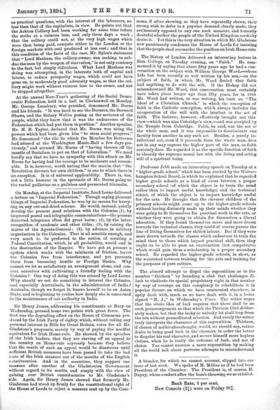The Bishop of London delivered an interesting lecture in Sion
College, on Tuesday evening, on "Faith." He com- menced it by saying that about fifty years ago he had a con- versation on the subject with William George Ward,—whose Life has been recently so well written by his son,—on the subject of faith, in which Mr. Ward denied that faith had anything to do with the will. If the Bishop did not misunderstand Mr. Ward, that conversation must certainly have taken place longer ago than fifty years, for in 1844 Mr. Ward had written, or was writing, his book on "The Ideal of a Christian Church," in which the conception of faith is the Catholic conception, which always includes the co-operation of the will with the intellect in the act of faith. The lecturer, however, effectively brought out this view—which was also Coleridge's view,—and was accepted by Dr. Temple from Coleridge. Faith, he said, was the act of the whole man, and it was impossible to discriminate one faculty from another in any such act. Besides, a purely in- tellectual act, even if it proceeds from the whole man, does not in any way express the higher part of the man, as faith certainly does. He regarded it as the specific function of faith to identify the supreme moral law with the living and acting will of a spiritual being.


































 Previous page
Previous page